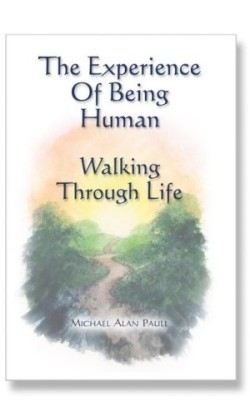
The Experience of Being Human
Walking Through Life
For author retired minister and poet Michael Alan Paull to be human is to accept oneself with all one’s imperfections and become sensitive to the stirrings of desire in one’s spirit that mark the urge to grow and discover oneself and the world in which one lives. The poems in the three volumes that make up the Experience of Being Human series were written over a period of time stretching from the 1970s through 2003. It was not the author’s initial intention to publish them; they were for him companions through traumatic and troubling times: the end of his first marriage the accidental death of his eighteen-year-old son stressful times as the pastor of a church; and joyful times like finding new love and delighting in the presence of God.
Paull does not claim academic credentials as a poet nor does he adhere to structural or formal poetic styles rather he declares that the poems came to him “in completed form word for word with no corrections or alterations.” Confessional in style they explore personal details of the writer’s life and Paull invites readers to engage them while remaining open to the possibility of an encounter with their own spirit.
Paull likens moving through life’s passages to “a long and soulful walk” and his poem by that name traces the poet’s steps into the unknown future anxious and fearful of the “formless void” he saw before him yet having the faith needed to take the “one step at a time” that would bring him home. “Feelings” explores the excitement of living with the awareness of one’s feeling nature and how overwhelming it can be when one becomes aware not only of one’s own feelings but of those of others as well. “The trouble with life outside of you / is that it touches the life inside you” the poet declares deciding that life requires the openness to feel love deeply all the while knowing that it “demands to be given away.”
Highlights of this volume include “The Place of Quiet Tears” notable for its tone of gentle intimacy; “The Meeting Place of Grief” which looks at the heart as meeting place and unifier; and “Can Christ be Far Behind” which moves beyond the personal to the coming of the Cosmic Christ when “time shall be no more.”
There are many ways to read and appreciate poetry; some read for excellence in craft delighting in verbal edifices built of revered forms and structures while others may read just for the pleasure of the movement of language through mind or mouth; other readers may find a poet whose emotional make-up is like their own and allow the words to provoke pleasure or pain almost without noting whether or not the poet possesses a fully developed sense of the craft. This last type of reader may take the most pleasure in the works of Paull and join with him in wrestling with the questions inherent in their own human experience.
Disclosure: This article is not an endorsement, but a review. The publisher of this book provided free copies of the book and paid a small fee to have their book reviewed by a professional reviewer. Foreword Reviews and Clarion Reviews make no guarantee that the publisher will receive a positive review. Foreword Magazine, Inc. is disclosing this in accordance with the Federal Trade Commission’s 16 CFR, Part 255.
